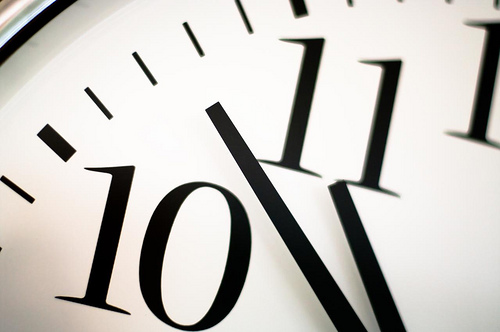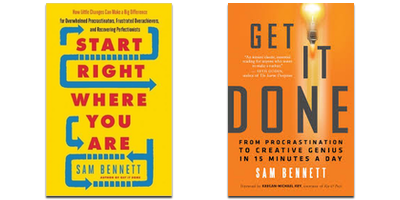
Asking yourself the question “Where will I think to look for this?” might be the single greatest organizational step you can take.
Asking yourself this question puts you in a state of awareness about your organizational style and creates an automatic mnemonic so you are even more likely to remember later on.
If I can imagine that the last time I put away a bottle of vanilla extract I thought, “Well, I’ll probably think to look for this with the rest of the baking stuff or maybe with the spices,” and then I put it with the rest of the baking stuff, well, I’ve got a better than fifty fifty chance of finding it right away the next time I need vanilla.
Certainly much higher than if I just jam it on a shelf somewhere where it eventually gets shoved to the back (because it’s a seldom-used item) and where I’ll never find it because I’m not even sure I have any to begin with because I don’t remember the last time I put it away.
This leads to buying more vanilla extract, which, if you use the pure extract (and you really should; the imitation stuff is terrible) is pretty darn expensive.
So why buy two when one, well placed, will do?
Again, the question is not, “Where should this go?” The question is, “Where, given my actual life, would I think something like this might end up?”
This is also a great question to ask yourself in parking garages, although there it sounds more like, “How will I remember which spot this is when I return?”
A good system is practical, realistic, easy, and even fun.
A bad system is impractical, unrealistic, hard, and a bummer.
You, your stuff, your space, and your art all deserve great systems.

Get out a piece of paper and write “Could Do” at the top.
I like “could-do” lists because I find “to-do” lists too dictatorial.
They make me feel pressured and antsy and reluctant and even belligerent — like a pouting high schooler who’s being harassed to do her homework.
But the words “could do” put me in a place of choice.
I could do the laundry, or I could walk around in dirty, smelly clothes.
I have a choice.
Even if the task is something I know I must do, I feel more relaxed if I remember that I have the option to not do it.
Plus, we’re not trying to think of things that you will do for sure; we’re just brainstorming things that you could
do.
Maybe you will, and maybe you won’t — we don’t know yet. We ’ll just have to see how you feel.
Here are some suggestions about where to start your own could-do list.
1. Write down the name of a person who could really help you out on this project. Maybe it’s someone you know, maybe it’s a hero who inspires you, or maybe it’s someone from ancient history who could serve as an imaginary
guide.
You might also want to make a note about how this person could be of assistance. Could she give you advice? Introduce you to someone? Cheerlead? Proofread?
2. Write down the name of someone who will not help you out on this project. Maybe it’s someone who will be helpful to you down the road (but not right now), or someone who is always a big ol’ Debbie Downer. Regardless, take a moment to think about the person with whom you will not discuss your project today.
Notice that it doesn’t mean that you don’t love him, admire him, value his opinion, whatever — it just means that as of today, you are going to consider the option of keeping this project out of his sticky, sticky hands.
3. Write down one simple, easy, and affordable step you might take toward working on your project. This should be something that will take you less than fifteen minutes and that you can very easily afford. That’s right — I’m talking baby steps.
What is one tiny, incremental gesture you might make toward your project today?
Is there:
• something you could research?
• some tool you could buy or borrow?
• some doodle or outline you could sketch out?
• some phone call or email you could easily execute?
Yep. That’s all there is to it.
If you write down one small thing you can do every morning (before checking your email) you will make astounding progress and — bonus — you will feel great.
Because as much as procrastination hurts your heart, moving forward — even just a little, tiny bit — makes your heart sing.
ACTION STEP:
Tell a supportive friend or colleague about your project, and ask them for any encouraging ideas, insights, or suggestions.

Here’s a great question I’ve gotten a bunch recently — it gets phrased different ways, like…
“What would a daily schedule look like for me as an independent artist?”- K.
“How to complete things and avoid being overwhelmed?” – J.
“Should you focus on one goal or several?” – Daddio
“Help! How to plan so I’m not just responding to the urgent?!” – C.
“Guidance on sticking with one project while so many new ideas call for action”- K.
Here’s my answer: I wonder if this is actually a problem for you.
Or to put it another way….
Here’s my other answer: What result are you seeking that you are currently not getting?
The thing is, creative people have a lot of weird ways of getting things done. Ways that look completely bananas to the outside world. It’s like we’re the rheumy-eyed uncles who drink and smoke and say rude things and somehow end up living healthy as a horse until the age of 102. We’re an anomaly.
Not knowing the details of your work or your habitual pitfalls, it’s hard for me to give you specific advice, so I’ll just pull back the curtain and let you in on what I do:
I don’t really keep a regular schedule. I work when I want to work, or when it’s needful for me to work, and I goof off the rest of the time. I spend an inordinate amount of time learning, reading, listening to audios, and a shocking amount of time just having conversations with people I find interesting. I’m not very good about setting time limits or about “balance” in my life — whatever that’s supposed to mean.
I often go through long weeks when, much to my frustration, it seems like nothing is happening. In those times I remind myself that every field must lay fallow.
At other times I’m scheduled up to my eyeballs and I’m an absolute whirling dervish of productivity.
I pretty much always DO do the following:no electronics on Sundays
- no electronics in the bedroom
- generally I’m done by 7pm and then I’m off all night
- walk or swim every day
- meditate every day
- make a list each morning of the THREE things that MUST get done that day
- keep a running list of the bajillion of other things that need doing
- keep a “genius” folder for great ideas that I’m not ready to move forward on yet
I find that I work better when I have a few big projects going simultaneously. But “a few” meaning 3-5… not 12-30, you know?
Otherwise, I’ve learned to trust myself and to go with the flow. Some days I’m craz-zay-zee productive. Some days I go back to bed at 11am. Some days I write, some days I do the money stuff, some days I plan long-term, some days I putter and piddle the whole day away.
Now, I know a lot of very successful people who lead far more regimented lives than this, and I admire them.
And if you are NOT getting the results in your life that you want, well….you may want to try imposing some more structure on your day. BUT ONLY IF YOU KNOW YOURSELF TO BE THE KIND OF PERSON WHO RESPONDS WELL TO STRUCTURE. You know what I mean?
But make sure you do it in the way that works for YOU. So if you’re all energetic in the morning, schedule your hardest tasks for then. Eat your broccoli first, as it were.
And if you know that you only write well without interruptions, then for heaven’s sake, turn off your phone when you sit down to compose.
So my message is this: Put Down The Whip.
You don’t need to be better than you are.
You’re a strange bird, and you’re going to have to surf your schedule in whatever way seems right to you.
My guess is you probably don’t have to work any harder than you do already, but you may have to learn to work smarter. And that may mean saying “no” to people who are time-sucks, turning your back on household tasks and keeping your focus on your highest-income producing activities.
Please let me know how it’s all going with you

I get this sort of question a lot:
“Help me get my 15 minutes! Life is so busy. The kids, dog and husband need so much! I’m going crazy.” – K.H.
“Do you know how to squeeeeeeeze a few more hours out of a day? LOL – C.C.
Here is my not-kidding answer:
DO LESS STUFF.
That’s right. You heard me.
Do less.
And here’s an exercise to show you HOW to do that:
1) Write down all of the activities that you typically do in a day, like, say…
drive car pool
laundry
pay bills
make phone calls
write
work out
get the mail
read
work with clients
play with the kids
plan upcoming travel
coordinate volunteers/charity work
grocery store
cook supper
watch TV
2) Now, put an asterisk next to the tasks that ONLY you can do. Using our previous list that would be something like:
write
work out
read
work with clients
play with the kids
3) Find some way to get those other items off your plate.
You may need to hire someone, you may be able to simply ask some of the other grown-ups in your life for help. Teach the kids to do the laundry and get a co-chair to work with the volunteers.
Yes, you will have to get over some of your perfectionism – nobody else is going to do as good of a job cooking dinner or sorting the laundry as you do. But guess what? You have bigger fish to fry.
Your creative life is never going to take precedence over your quotidian life unless you make it happen.
Let me say this one more time:
The work that only you can do, you must do.
The work that anyone can do, someone else must do.
And if you’d like some help strategizing & executing, please consider working with me one-on-one and fill out my VIP Application here: http://bit.ly/VIPapp
Let me know how it goes for you, OK?
Some things are easy and some things are hard, but not always in the way you might expect.
- Fast food seems easy, but in the long run, it is very hard on your system.
- Not saying, “Hi” to clerks, colleagues, acquaintances and strangers might seem easy (the rationale being something like, “just keep your head down – you don’t really know them – no need to get involved in a long conversation…”) but ultimately it is much harder to live in a world in which everyone is a stranger.
- Working out is hard, but it’s easier than the loss of self-esteem that comes with feeling weak.
- Hosting dinner parties seems much harder than not hosting dinner parties, but maintaining strong social ties with the people you care most about will make your life much, much easier overall. Plus it gives you a great reason to clean your house, which seems hard but, once the joint is clean seems wonderfully easy.
- Putting off working on the projects that matter most to you (completing your writing project, organizing your sewing room, making that baby present, creating that one-person show, launching that online magazine, clearing out your basement, returning to your watercolors, finding the time to meditate…) sort of seems easier – which is why we sometimes characterize this putting off as “laziness” – but it actually causes you great pain. Psychic pain, spiritual pain, artistic pain, pain in your self-respect, pain around your legacy…And that pain is HARD.
If you want to know the TRUTH about procrastination, please join me for the “Procrastination Is Genius In Disguise: Discover the 5 Surprising Truths About What’s Holding You Back” FREE teleclass on Thursday, Jan. 20th.
Register now for free and you can attend the call live via phone, Skype or streaming audio webinar AND you’ll get the recording as my gift to you.
Go here to register and for more info: http://www.GetItDoneTeleclass.com
And tell your friends, won’t you? Thanks.





